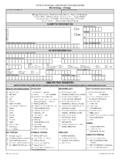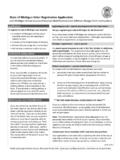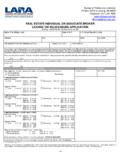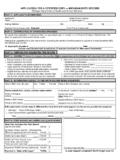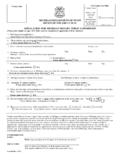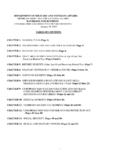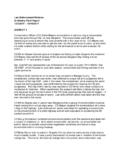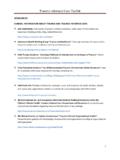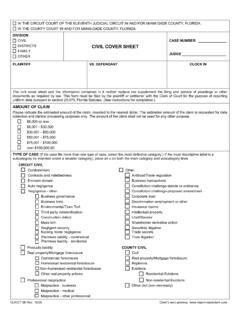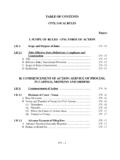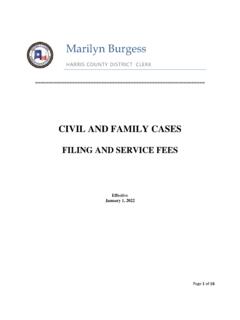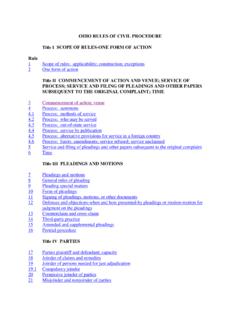Transcription of PERSONS WITH DISABILITIES CIVIL RIGHTS ACT
1 PERSONS with DISABILITIES CIVIL RIGHTS ACTAct 220 of 1976AN ACT to define the CIVIL RIGHTS of PERSONS with DISABILITIES ; to prohibit discriminatory practices, policies,and customs in the exercise of those RIGHTS ; to prescribe penalties and to provide remedies ; and to provide forthe promulgation of : 1976, Act 220, Eff. Mar. 31, 1977; Am. 1980, Act 478, Imd. Eff. Jan. 20, 1981; Am. 1992, Act 123, Imd. Eff. June 29,1992; Am. 1998, Act 20, Imd. Eff. Mar. 12, People of the State of Michigan enact:ARTICLE Short 101. This act shall be known and may be cited as the PERSONS with DISABILITIES CIVIL RIGHTS act .History: 1976, Act 220, Eff. Mar. 31, 1977; Am. 1998, Act 20, Imd. Eff. Mar. 12, Opportunity guaranteed; CIVIL right; accommodation of person with disability; 102. (1) The opportunity to obtain employment, housing, and other real estate and full and equalutilization of public accommodations, public services, and educational facilities without discriminationbecause of a disability is guaranteed by this act and is a CIVIL right.
2 (2) Except as otherwise provided in article 2, a person shall accommodate a person with a disability forpurposes of employment, public accommodation, public service, education, or housing unless the persondemonstrates that the accommodation would impose an undue : 1976, Act 220, Eff. Mar. 31, 1977; Am. 1980, Act 478, Imd. Eff. Jan. 20, 1981; Am. 1990, Act 121, Imd. Eff. June 25,1990; Am. 1998, Act 20, Imd. Eff. Mar. 12, 103. As used in this act:(a) Alcoholic liquor means that term as defined in section 105 of the Michigan liquor control code of1998, 1998 PA 58, MCL (b) Commission means the CIVIL RIGHTS commission established by section 29 of article V of the stateconstitution of 1963.(c) Controlled substance means that term as defined in section 7104 of the public health code, 1978 PA368, MCL (d) Except as provided under subdivision (f), disability means 1 or more of the following:(i) A determinable physical or mental characteristic of an individual, which may result from disease,injury, congenital condition of birth, or functional disorder, if the characteristic:(A) For purposes of article 2, substantially limits 1 or more of the major life activities of that individualand is unrelated to the individual's ability to perform the duties of a particular job or position or substantiallylimits 1 or more of the major life activities of that individual and is unrelated to the individual's qualificationsfor employment or promotion.
3 (B) For purposes of article 3, is unrelated to the individual's ability to utilize and benefit from a place ofpublic accommodation or public service.(C) For purposes of article 4, is unrelated to the individual's ability to utilize and benefit from educationalopportunities, programs, and facilities at an educational institution.(D) For purposes of article 5, substantially limits 1 or more of that individual's major life activities and isunrelated to the individual's ability to acquire, rent, or maintain property.(ii) A history of a determinable physical or mental characteristic described in subparagraph (i).(iii) Being regarded as having a determinable physical or mental characteristic described in subparagraph (i).(e) Drug means that term as defined in section 7105 of the public health code, 1978 PA 368, (f) For purposes of article 2, disability does not include either of the following:(i) A determinable physical or mental characteristic caused by the current illegal use of a controlledsubstance by that individual.
4 (ii) A determinable physical or mental characteristic caused by the use of an alcoholic liquor by thatRendered Monday, January 09, 2012 Page 1 Michigan Compiled Laws Complete Through PA Compiledthrough Act 255 & includes 257, 259-263, 268, 270-272, 276 &280 of 2011 Legislative Council, State of MichiganCourtesy of , if that physical or mental characteristic prevents that individual from performing the duties of hisor her job.(g) Person includes an individual, agent, association, corporation, joint apprenticeship committee,joint-stock company, labor union, legal representative, mutual company, partnership, receiver, trust, trustee inbankruptcy, unincorporated organization, this state, or any other legal, commercial, or governmental entity oragency.(h) Person with a disability or person with DISABILITIES means an individual who has 1 or moredisabilities.(i) Political subdivision means a county, city, village, township, school district, or special district orauthority of this state.
5 (j) State average weekly wage means the state average weekly wage as determined by the Michiganemployment security commission under section 27 of the Michigan employment security act, 1936 (Ex Sess)PA 1, MCL (k) Temporary employee means an employee hired for a position that will not exceed 90 days induration.(l) Unrelated to the individual's ability means, with or without accommodation, an individual's disabilitydoes not prevent the individual from doing 1 or more of the following:(i) For purposes of article 2, performing the duties of a particular job or position.(ii) For purposes of article 3, utilizing and benefiting from a place of public accommodation or publicservice.(iii) For purposes of article 4, utilizing and benefiting from educational opportunities, programs, andfacilities at an educational institution.(iv) For purposes of article 5, acquiring, renting, or maintaining : 1976, Act 220, Eff.
6 Mar. 31, 1977; Am. 1980, Act 478, Imd. Eff. Jan. 20, 1981; Am. 1990, Act 121, Imd. Eff. June 25,1990; Am. 1992, Act 123, Imd. Eff. June 29, 1992; Am. 1998, Act 20, Imd. Eff. Mar. 12, 1998; Am. 1999, Act 201, Eff. Mar. 10, 's note: Enacting section 1 of Act 201 of 1999 provides: Enacting section 1. This amendatory act is curative and intended to correct any misinterpretation of legislative intent in the court ofappeals decision in Doe v Department of Corrections, 236 Mich App 801 (1999). This legislation further expresses the original intent ofthe legislature that an individual serving a sentence of imprisonment in a state or county correctional facility is not within the purview ofthis act. ARTICLE 201. As used in this article:(a) Employee does not include an individual employed in domestic service of any person.(b) Employer means a person who has 1 or more employees or a person who as contractor orsubcontractor is furnishing material or performing work for the state or a governmental entity or agency of thestate and includes an agent of such a person.
7 (c) Employment agency means a person regularly undertaking with or without compensation to procureemployees for an employer or to procure for employees opportunities to work for an employer and includesan agent of such a person.(d) Genetic information means information about a gene, gene product, or inherited characteristic of anindividual derived from the individual's family history or a genetic test.(e) Genetic test means the analysis of human DNA, RNA, chromosomes, and those proteins andmetabolites used to detect heritable or somatic disease-related genotypes or karyotypes for clinical genetic test must be generally accepted in the scientific and medical communities as being specificallydeterminative for the presence, absence, or mutation of a gene or chromosome in order to qualify under thisdefinition. Genetic test does not include a routine physical examination or a routine analysis including, but notlimited to, a chemical analysis of body fluids unless conducted specifically to determine the presence,absence, or mutation of a gene or chromosome.
8 (f) Labor organization includes:(i) An organization of any kind, an agency or employee representation committee, group, association, orplan in which employees participate and which exists for the purpose, in whole or in part, of dealing withemployers concerning grievances, labor disputes, wages, rates of pay, hours, or other terms or conditions ofemployment.(ii) A conference, general committee, joint or system board, or joint council which is subordinate to anational or international labor Monday, January 09, 2012 Page 2 Michigan Compiled Laws Complete Through PA Compiledthrough Act 255 & includes 257, 259-263, 268, 270-272, 276 &280 of 2011 Legislative Council, State of MichiganCourtesy of (iii) An agent of a labor : 1976, Act 220, Eff. Mar. 31, 1977; Am. 1990, Act 121, Imd. Eff. June 25, 1990; Am. 2000, Act 32, Imd. Eff. Mar. 15, Employer; prohibited conduct; exceptions; access to genetic 202. (1) Except as otherwise required by federal law, an employer shall not:(a) Fail or refuse to hire, recruit, or promote an individual because of a disability or genetic informationthat is unrelated to the individual's ability to perform the duties of a particular job or position.
9 (b) Discharge or otherwise discriminate against an individual with respect to compensation or the terms,conditions, or privileges of employment, because of a disability or genetic information that is unrelated to theindividual's ability to perform the duties of a particular job or position.(c) Limit, segregate, or classify an employee or applicant for employment in a way which deprives or tendsto deprive an individual of employment opportunities or otherwise adversely affects the status of an employeebecause of a disability or genetic information that is unrelated to the individual's ability to perform the dutiesof a particular job or position.(d) Fail or refuse to hire, recruit, or promote an individual on the basis of physical or mental examinationsthat are not directly related to the requirements of the specific job.(e) Discharge or take other discriminatory action against an individual on the basis of physical or mentalexaminations that are not directly related to the requirements of the specific job.
10 (f) Fail or refuse to hire, recruit, or promote an individual when adaptive devices or aids may be utilizedthereby enabling that individual to perform the specific requirements of the job.(g) Discharge or take other discriminatory action against an individual when adaptive devices or aids maybe utilized thereby enabling that individual to perform the specific requirements of the job.(h) Require an individual to submit to a genetic test or to provide genetic information as a condition ofemployment or promotion.(2) Subsection (1) does not prohibit an individual from voluntarily providing to an employer geneticinformation that is related to the employee's health or safety in the workplace. Subsection (1) does notprohibit an employer from using genetic information received from an employee under this subsection toprotect the employee's health or safety.(3) This section shall not apply to the employment of an individual by his or her parent, spouse, or child.
